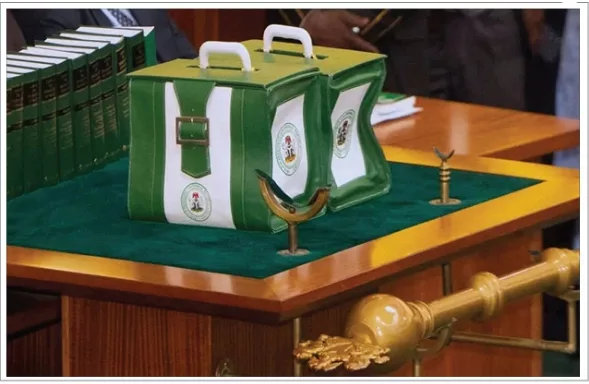With Nigeria’s 2024 proposed budget largely expected to pass the scrutiny of the National Assembly, there are indications that there may be fiscal hurdles in the offing. This is because contrary to the perception that President Bola Tinubu’s proposed 2024 fiscal budget of N27.5 trillion is a step aimed at revving up the country’s GDP, it would seem as though the sliding value of the naira would erode the capacity of the federal government to meet all of its desired capital goals.
In dollar terms, the proposed 2024 budget is circa $15 billion lower than the current fiscal budget.
This is because in real terms, the proposed 2024 budget is merely $32 billion when converted to the United States dollar based on the current exchange rate of the naira to the dollar, which has lost value by 92% since the assumption of power by President Bola Tinubu.
It will be recalled that at the twilight of the Buhari administration, the naira exchanged at N460/$1 at the I&E window of the Central Bank of Nigeria (CBN). Today, the naira exchanges at the rate of N881/$1.
By the prevailing exchange rates to the dollar, Nigeria’s budget in 2018 was $23.41 billion; in 2019, it was $27.41 billion; in 2020 it was $28.30 billion. In 2021, it was $32.78 billion; in 2022, the budget was $40.5 billion, and in 2023, the election year, the budget is $47.5 billion.
President Tinubu is proposing a N27.5 trillion budget, which is equivalent to $32 billion. That is approximately $15 billion less than the budget for the current fiscal year.
Since Nigeria is mostly an import-dependent country the lower cost of purchase of goods and services in the local currency may have limited utility on government spending.
Also, there are other implications of lower budget for the 2024 fiscal year. A low budget in a country can have far-reaching implications the economy, affecting various sectors and aspects of economic development.
An economist at Cashlinks Limited, Paul Ezeibe, noted that low budget constrains the government’s ability to invest in critical infrastructure projects such as roads, bridges, airports, and utilities. He said insufficient funding of critical infrastructure at such a time can lead to delays or cancellations of projects, hindering economic development.
Commenting on the social welfare of Nigerians, he said low budgets often result in reduced funding for education and healthcare. “This can lead to inadequate resources for schools and hospitals, affecting the quality of services and limiting access to education and healthcare for the population,” he stated.
Also commenting, financial economist and lecturer at Ebonyi State University, Dr. Nelson Nkwo, said low budget may limit the government’s capacity to create public sector jobs, which can contribute to unemployment and hinder economic growth. He stressed that public sector employment often serves as a stabilizing force in the job market.
According to him, “Insufficient government spending can also lead to a slowdown in economic growth. Government expenditure is a significant driver of economic activity, and a low budget can dampen demand, investment, and overall economic expansion.”
Nkwo cited that the Tinubu government is faced with the dilemma of speedy economic growth to alleviate the suffering of the Nigerian people and at the same time faced with relentless inflation caused by low productivity and an ever-widening exchange rate.
He said a country with a low budget usually resorts to borrowing to meet its financial obligations. “This can result in an accumulation of debt, leading to challenges in debt management, servicing, and repayment,” he noted.
Limited budgetary resources can contribute to inflationary pressures, especially if the government resorts to printing money to finance its activities. Inflation erodes the purchasing power of the currency, impacting the cost of living for citizens.
Dr. Sarah Okafor, an economic affairs analyst, cited that a low budget may signal fiscal challenges and economic instability, potentially reducing investor confidence. “This can lead to capital flight, reduced foreign direct investment, and a negative impact on the country’s credit rating.
She stated that the proposed N27.5 trillion budget for the 2024 fiscal year is not an encouraging message to international investors whom President Tinubu has been striving to woo into the country over the last few months.
She added that budget constraints may result in reduced funding for social safety nets and poverty alleviation programs. “This can exacerbate income inequality and hinder the improvement of living standards for vulnerable populations,” she said.
She also said addressing the implications of a low budget requires a comprehensive approach, including fiscal reforms, prioritized spending, and efforts to stimulate economic growth. “Collaboration between the government, private sector, and international partners is often essential to overcome the challenges associated with limited budgetary resources,” she said.
Still commenting on the budget, a lecturer at Nnami Azikiwe University, Dr. Felix Echekoba, observed that a major concern for the administration at the moment is curbing inflation, which would imply slower economic growth. He added that it would also imply less than robust measure to curb unemployment.





